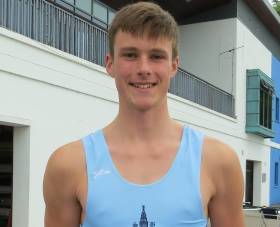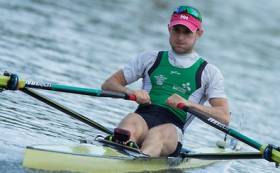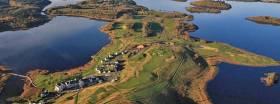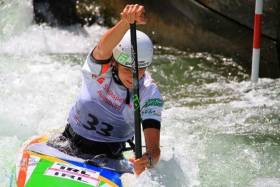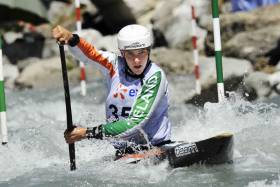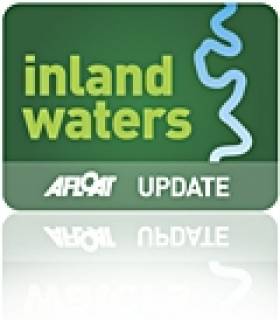Displaying items by tag: Irish Open
Liam Jegou Wins at Canoe Slalom Irish Open
#Canoeing: Liam Jegou, Sam Curtis and Aisling Conlan all had wins at the canoe slalom Irish Open at the Sluice Weir in Lucan today. Jegou, who travelled from his base in Pau in France for the event, was the top C1 paddler, while Curtis and Conlan won their K1 events. The Ireland selection event for the season will be held at La Seu d’Urgell in Spain next month.
Canoe Slalom Irish Open, Dublin, Sunday (Selected Results; results on best of two runs)
Men
K1: Sam Curtis 79.87 seconds. Junior: Adam Vaugh 93.82.
C1: Liam Jegou 81.76
Women
K1: Aisling Conlan 103.20.
Dorney and Lynch top Junior Rankings at All Ireland Open and Youth Regatta
Jack Dorney of Shandon won the junior 18 single sculls at the Irish Open and All Ireland Junior Regatta at the National Rowing Centre in Cork today. His nearest rival was James O’Donovan of Castleconnell. Both represented Ireland this season and both are junior again for the 2019 season.
Aoife Lynch of Lee was the top junior woman, just ahead of Lauren O’Brien of Castleconnell.
The best women’s open pair of the day was the UCC/Skibbereen combination of Tara Hanlon and Niamh Casey.
Irish Open Off Because of Poor Weather Forecast
#Rowing: The Irish Open, scheduled for this weekend has been cancelled. The forecast was not good and the organisers decided not to continue with the event. The official announcement said that “in the interest of safety and fairness” Rowing Ireland had cancelled the event.
O'Donovans Return With a Win
#Rowing: Paul and Gary O'Donovan won the doubles final at the Irish Open Regatta at the National Rowing Centre today. The Olympic silver medallists were given a tough race by Shane O'Driscoll and Mark O'Donovan, who led coming up to half way, only to see the O'Donovan brothers find a new gear to move away and win well.
The women's double went to the novel combination of Sanita Puspure (34) and Emily Hegarty (18). Even though well clear of the field, they powered home with impressive style.
Irish Open Rowing Championships, National Rowing Centre (Selected Results; graded on top times from heats)
Men
Eight - 1 NUIG, Grainne Mhaol (sen) 6:08, 2 UCC, Shandon (sen) 6:17, 3 NUIG, Grainne Mhaol (u23) 6:21.
Four - 1 UCD (E Gleeson, R Thompson, S Mulvaney, D O'Malley; under-23) 6:34, 2 Trinity, UCD (senior) 6:40, 3 Commercial (junior) 6:57.
Quadruple - 1 Clonmel, UCC, Shandon (J Casey, D Begley, R Byrne, D Lynch; u23) 6:28, 2 Queen's, Castleconnell (sen) 6:33, 3 Carlow, Clonmel, Cork (jun) 6:36.
Double - 1 Skibbereen, UCD (G O'Donovan, P O'Donovan; sen) 6:39, 2 Skibbereen (sen) 6:45, 3 Skibbereen (u23) 6:48; 7 Three Castles A (jun) 7:05.
Women
Eight - 1 NUIG (sen) 7:22.
Four - 1 Cork, Skibbereen (T Hanlon, A Mason, N Casey, E Cialis; u23) 7:37, 2 Queen's, Belfast BC, Methodist (sen) 7:42, 3 Commercial (jun) 7:51.
Quadruple - 1 UCD, Queen's, Fermoy (E Lambe, S Bouanane, O Blundell, A Crowley; sen) 7:24, 2 Cork, Kenmare (jun) 7:42, 3 Lee Skibbereen (sen) 7:50.
Double - 1 Old Collegians, Skibbereen (S Puspure, E Hegarty; senior) 7:29, 2 Skibbereen (sen) 7:41, 3 Lee A (jun) 7:55; 9 UCD, Belfast (u23) 8:16.
O'Donovans Shine in Ireland Trial
#Rowing: Paul O'Donovan won the final of the single sculls at the Irish Open, the first trial of the new season at the National Rowing Centre today. The World Champion in the lightweight single sculls did not have the fastest time in his heat, but only his Olympic crewmate and brother Gary tested him in the final. Gary slowed and virtually stopped with 250 metres to go, and though he resumed his challenge, his younger brother was on his way to the win. Shane O'Driscoll was third and Daire Lynch, who is just 18, fourth.
Sanita Puspure was an emphatic winner of the women's single, while UCD won the women's and men's pairs.
Irish Open Rowing Championships, National Rowing Centre (Selected Results)
Men
Pair - A Final: 1 UCD B (u23) 7:24.265, 2 Trinity (sen) 7:36.156, 3 NUIG (sen) 7:40.844. B Final: UCD A (u23) 7:44.499. C Final: 2 St Joseph's (jun) 8:08.83.
Single - A Final: 1 P O'Donovan (sen) 7:33.694, 2 G O'Donovan 7:36.616, 3 S O'Driscoll (sen) 7:38.710, 4 D Lynch (u23) 7:42.991, 5 F McCarthy (u23) 7:48.273, 6 C Beck (sen) 7:49.195. B Final: M O'Donovan 7:45.736. C Final: 3 D Begley (jun) 8:06.261.
Women
Pair - A Final: 1 UCD(sen) 8:12.88, 2 Cork Boat Club (u23) 8:19.72, 3 Fermoy (jun) 8:29.17. B Final: Commercial A (jun) 8:5023.
Single - A Final: 1 S Puspure (sen) 8:08.596, 2 D Walsh (sen) 8:26.816, 3 E Hegarty (u23) 8:40.582. B Final: M Cremen (jun) 8:53.36.
Lough Erne Loses 2017 Irish Open
#LoughErne - It's been confirmed that the Lough Erne Resort will no longer host next year's Irish Open golf tournament.
As reported on Afloat.ie earlier this year, changes in the European golfing scene had cast doubt on the Fermanagh lakeland resort hosting of the 2017 event in after getting the nod two years ago before its purchase by American business tycoon Tony Saliba.
Those doubts were confirmed last week, as the News Letter reports, with a statement from the Lough Erne Resort that it is "extremely disappointed" that the European Tour has announced a change in venue.
It's understood that the sport's new European bosses favour a links course for the annual Irish Open, with Portstewart Golf Club on the North Coast a likely candidate.
The News Letter has more on the story HERE.
Liam Jegou Impresses at Irish Open in Lucan
#Canoeing: Liam Jegou (20) took until his second run to master a tough course at the canoe slaolm Irish Open at Lucan today. The C1 competitor lowered the time of his first run by over 10 seconds, setting a winning mark of 90.81 seconds. Mike Kurt, the Swiss international who set the pace in the K1, also struggled on his first run on a course where two upstream gates below the sluice tested all the competitors. Kurt nailed it on the second run, with the best penalty-free time of the day – 89.08 seconds. Ciarán Heurteau, recovering from injury and a break from the sport, was the best Ireland senior competitor, being credited with 95.01 seconds, which included four seconds in penalties. Sam Curtis was bang in form at under-23 level: his first run was a winning one of 90.56 seconds. He bettered the time in the second run (88.64) but was adjudged to have touched one gate and missed another, so incurring 52 points in penalties.
Hannah Craig was the top woman competitor in the senior K1, while Caoimhe O’Ferrall set an excellent time of 121.92 in the C1, though she is just 18.
Canoe Slalom Irish Open, Lucan, Sunday (Selected Results)
Men
K1 – Senior: 1 M Kurt 89.08, 2 C Heurteau 95.01, 3 P Hynes 110.55. Under-23: S Curtis 90.56. Under-18: L Palmer 105.42. Masters: A Boland 114.79. Vets: G Collins 135.86.
C1 – Under-23: 1 L Jegou 90.81, 2 R Hendrick 99.25, 3 J Cochrane 101.34. Under-18: E Moorhouse 124.24. Under-16: F McNally 121.7
Women
K1 - Senior: H Craig 109.13. Under-23: G Ridge 108.5. Under-18: M Hamer Evans 109.06. Under-16: K Davidson 128.4.
C1 - Under-23: C O’Ferrall 121.92.
Ireland International Places on the Line at Lucan
#Canoeing: The top Irish competitors in canoe slalom will be in action at the Irish Championships at the Sluice Weir in Lucan this Saturday and Sunday, March 5th and 6th. The races at the redeveloped Sluice Weir in the Lucan Demesne/St Catherine’s Park, will double as selection races for the Ireland senior and junior international teams for:
- The Senior European Championships in Liptovsky Mikulas, (Slovakia) in May.
- The five-event World Cup series in Ivrea (Italy), La Seu d’Urgell (Spain) and Pau (France) in June and in Prague (Czech Republic) and Tacen (Slovenia) in August.
- Junior and Under 23 World Championships in Krakow (Poland) in July and European Championships in Solkan (Slovenia) at the end of August.
The Senior European Championships in Liptovsky Mikulas will also count as the final qualification event for places at the Olympic Games. Only one place is available in each class to European countries who have not yet qualified.
Racing on both days will feature London 2012 K1 finalist Hannah Craig, who is entering her second season back to competition following the birth of her son Arlo in May 2014. Hannah has spent the winter at the artificial whitewater course in Nottingham, England in preparation for the 2016 season.
Competing in the C1 category will be Liam Jegou who took 6th place in the Under 23 European Championships in Krakow last year and got semi-final placings in two of his three World Cup races and in the World Championships in his first season of senior races. He has just completed a winter-training bloc on the artificial whitewater course in Al Ain, Dubai.
Robert Hendrick will double-up with his brother Noel in the Under 23 C2 class over the weekend, having taken 4th place in the Junior World Championships in Brazil last year.
In the K1M class, Ciarán Heurteau is coming back to Ireland from a two-month intensive winter training bloc in New Zealand to compete for a place at the European Champs and Olympic qualifier after being out of competition last season due to an anterior cruciate ligament injury which required surgery and rehabilitation.
To provide a good benchmark to assess selection performance levels, Canoe Slalom Ireland are bringing in Mike Kurt (30th in men’s kayak world rankings and semi-finalist in the 2015 World Championships) from Switzerland. The Welsh junior and under-23 team will also take part.
Lough Erne's Hosting Of Irish Open No Longer Certain
#LoughErne - Changes in the European golfing scene have cast doubt on Lough Erne's hosting of the Irish Open in 2017.
The Faldo Championship Course on the lough's shores was given the nod in early 2014 to host Ireland's most prestigious golf event, which was held at Royal County Down last summer.
Since then the Lough Erne Resort was snapped up by American business tycoon Tony Saliba.
But now the News Letter reports that European Tour officials have backed away from a firm commitment after the emergence of new stakeholders in Rory McIlroy's Rory Foundation and sponsor Dubai Duty Free – and a changing of the guard at the executive level.
According to a European Tour spokesperson, new CEO Keith Pelly "has big, big ideas about what he wants to do and the Irish Open is a key part of that strategy because it is one of the biggest tournaments.”
The News Letter has more on the story HERE.
Lough Erne Get The Nod For Irish Open In 2017
#LoughErne - The Faldo Championship Course on the shores of Lough Erne in Fermanagh will host golf's prestigious Irish Open in 2017, as the News Letter reports.
The news comes as part of a double announcement for Northern Ireland, which will also host next year's event at Royal County Down at Newcastle on the east coast.
Coming not long after Royal Portrush's hosting of the tournament in 2012 - Northern Ireland's first after more than 50 years - the move is indicative of the quality of the North's many championship-calibre courses and golf links.
And here's hoping the North's golfers - including Royal County Down local boy Rory McIlroy - will get to show their stuff on their greens and fairways when the time comes!


























